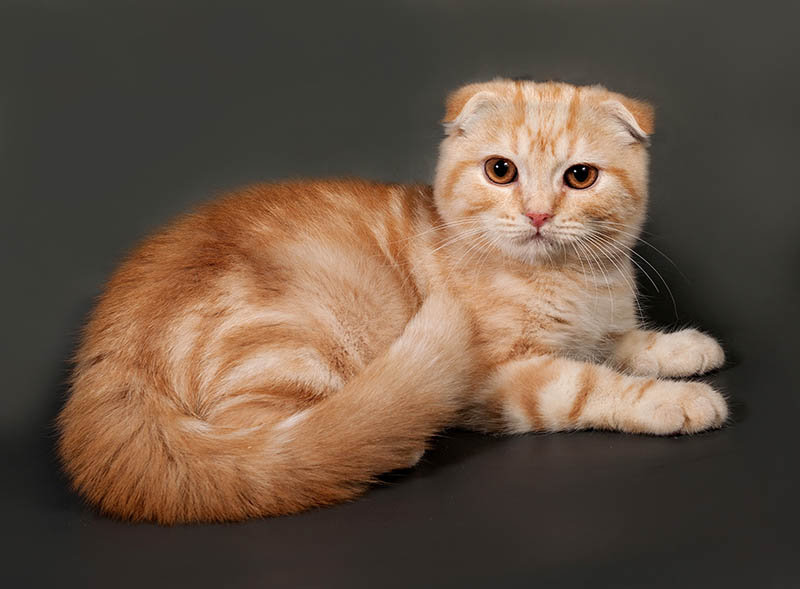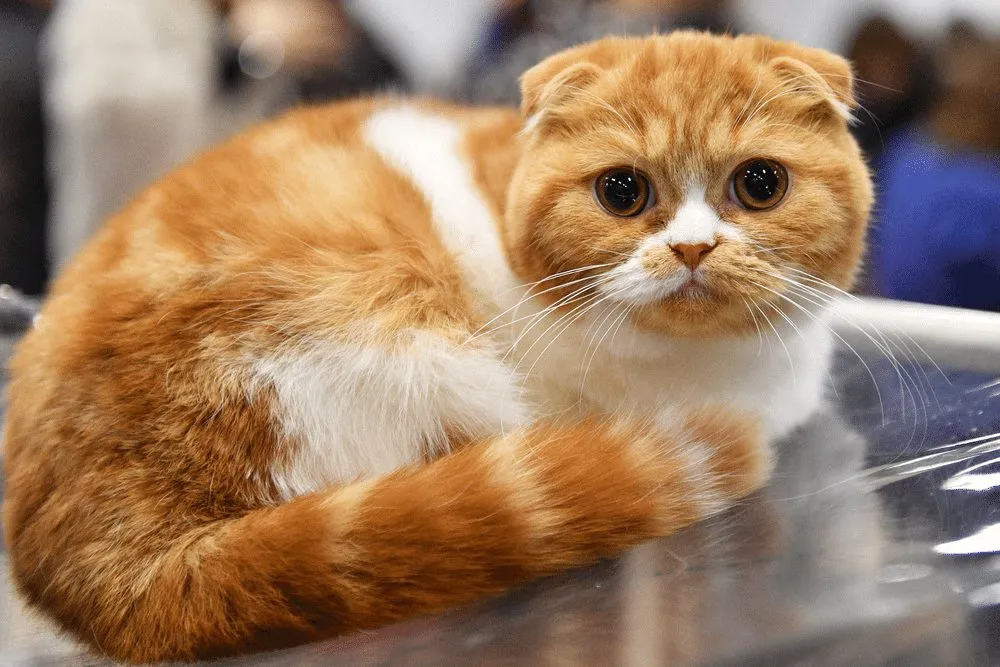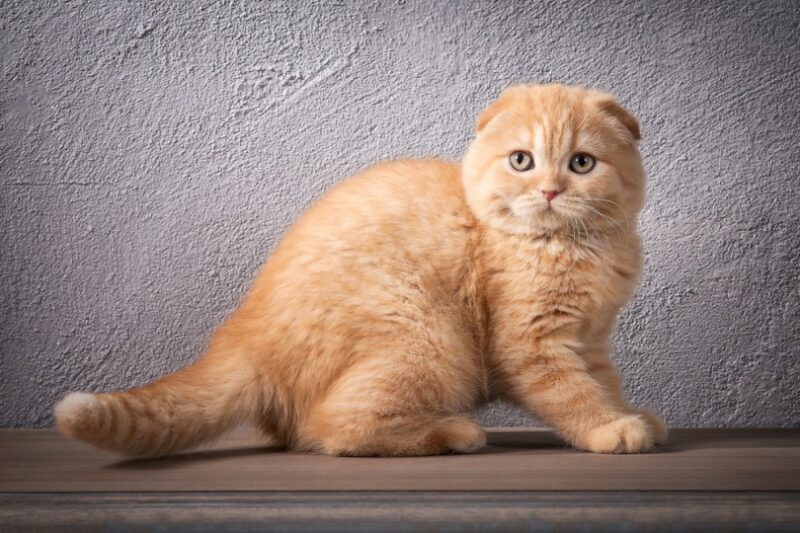Scottish Fold cats are known for their distinctive folded ears, caused by a genetic mutation that affects the cartilage in their ears. While these folded ears give them a unique appearance, there has been concern and controversy surrounding the health implications associated with this trait.
The mutation responsible for the folded ears in Scottish Folds can also lead to skeletal abnormalities. This condition is called osteochondrodysplasia, which affects cartilage throughout the body, not just in the ears. This can potentially lead to issues such as arthritis, joint pain, and cartilage-related problems.
While not all Scottish Folds will necessarily experience severe health issues, some may develop problems over time. It’s crucial for owners and breeders to prioritize the health and well-being of these cats by monitoring them for any signs of discomfort, pain, or mobility issues.
How do genetic mutations affect Scottish Folds’ health?
The genetic mutation causing folded ears in Scottish Folds is closely associated with various health concerns, particularly related to cartilage and skeletal development.
Description of the genetic mutation causing folded ears
The unique characteristic of Scottish Folds is the result of a genetic mutation affecting cartilage formation in their ears.
This mutation, known as the FGF5 gene mutation, leads to an abnormality in cartilage development, causing the ears to fold forward.
The cartilage’s altered structure is responsible for the distinct appearance of folded or bent ears in Scottish Folds.
Connection between the mutation and potential health issues

The same genetic mutation responsible for folded ears can affect cartilage throughout the cat’s body, leading to a condition called osteochondrodysplasia.
Osteochondrodysplasia can cause various skeletal abnormalities and cartilage-related issues, impacting the overall health of Scottish Folds.
The condition may lead to shorter and thicker tails, stiffened joints, and abnormal bone growth.
It can affect the spine, leading to vertebral abnormalities, and potentially causing discomfort, pain, or mobility issues.
Skeletal abnormalities and cartilage-related problems
The mutation can result in other skeletal issues beyond the folded ears, such as shortened limbs or tail abnormalities.
Cartilage problems caused by the mutation may lead to joint stiffness, difficulty moving, or an increased risk of arthritis.
Affected Scottish Folds might develop problems with their mobility, experiencing pain or discomfort while moving or jumping.
The altered cartilage structure might also lead to issues with the flexibility and durability of joints, impacting their overall quality of life.
What pain or discomfort results from genetic mutations in Scottish Folds?
Scottish Folds affected by the genetic mutation leading to skeletal abnormalities are at risk of experiencing various degrees of pain, discomfort, and mobility issues.
Potential signs of discomfort or pain in affected cats
Affected Scottish Folds may display subtle or overt signs of discomfort or pain, such as limping, reluctance to jump or play, and decreased activity levels.
Cats might exhibit behavioral changes like increased irritability, vocalization, or aggressiveness when touched in specific areas.
Some cats may groom excessively or avoid being touched due to pain sensitivity. Observing changes in posture, favoring certain limbs, or abnormal movement patterns can indicate discomfort or pain.
Risks of arthritis, joint pain, and mobility issues
The genetic mutation causing skeletal abnormalities in Scottish Folds predisposes them to a higher risk of developing arthritis and joint-related problems.
Osteochondrodysplasia can lead to early-onset arthritis due to abnormal cartilage development in joints, impacting their functionality.
Joint pain and stiffness can limit mobility, affecting the cat’s ability to move comfortably, jump, or engage in regular activities.
These issues can worsen over time, potentially reducing the affected cat’s quality of life if not managed properly.
Variability in the severity of health problems among individuals
The severity of health concerns and pain varies among individual Scottish Folds.
Some cats may exhibit mild symptoms or discomfort, while others might experience more pronounced and debilitating issues.
Factors such as genetics, environmental conditions, and individual variations contribute to this variability. Regular veterinary check-ups and monitoring are crucial to assess the extent of health problems and tailor specific management strategies for each cat.
How can owners manage health issues in genetically mutated Scottish Folds?

Responsible breeding practices play a critical role in reducing the prevalence of health issues in Scottish Folds.
Importance of responsible breeding practices
Responsible breeding is crucial to mitigate the health issues associated with Scottish Folds.
Ethical breeders focus on minimizing the propagation of the genetic mutation responsible for folded ears and associated skeletal abnormalities.
Avoiding breeding two folded-ear cats together helps reduce the likelihood of severe health issues in offspring. Screening for genetic abnormalities and prioritizing the overall health and well-being of breeding cats are fundamental practices.
Monitoring and regular veterinary check-ups for Scottish Folds
Regular veterinary check-ups are essential for Scottish Folds, especially those with known genetic mutations, to monitor their health status.
Veterinarians can conduct thorough examinations, including X-rays and mobility assessments, to detect early signs of joint problems or discomfort.
Routine check-ups facilitate early intervention and personalized treatment plans, optimizing the cat’s quality of life.
Strategies for managing potential health issues and pain
Pain management techniques may involve non-steroidal anti-inflammatory drugs (NSAIDs) prescribed by a veterinarian to alleviate joint pain and discomfort.
Controlled exercise routines and physical therapy can help maintain joint mobility and muscle strength, reducing the impact of skeletal issues.
Providing a comfortable and supportive environment, such as soft bedding and easy access to food and litter boxes, helps alleviate stress on joints.
Dietary adjustments, including supplements like glucosamine and chondroitin, may support joint health and alleviate symptoms of arthritis.
FAQ’s
Is Scottish Fold a friendly cat?
Scottish Folds are generally known for their friendly and gentle nature. They often enjoy companionship and are affectionate towards their owners.
Are Scottish Folds talkative?
Scottish Folds can be vocal but generally aren’t excessively talkative. They may communicate with soft meows or chirps rather than being overly vocal.
Can Scottish Folds live long?
Scottish Folds typically have an average lifespan of around 12 to 15 years with proper care, but some may live beyond that age range.
What kind of cat is Garfield?
Garfield, a popular fictional character, is portrayed as an orange tabby cat known for his love of food and humorous demeanor. He’s not specifically identified as a breed but resembles an American Shorthair or a mixed breed.
Do Scottish Folds only like one person?
Scottish Folds can form strong bonds with multiple family members but may show a preference for one person. However, individual personalities can vary.
Are Scottish Folds loyal?
Scottish Folds are often loyal and affectionate toward their owners. They may display loyalty by following their preferred person around the house and seeking their attention.
Final Words
In conclusion, Scottish Folds, known for their distinctive folded ears due to a genetic mutation, might face potential health challenges. This mutation can lead to skeletal issues like osteochondrodysplasia, causing joint pain and mobility problems.
Signs of discomfort include reduced activity and behavioral changes. Not all Scottish Folds will have severe issues, but responsible breeding and regular vet check-ups are crucial. Managing pain involves medication, controlled exercise, and a cozy environment.

